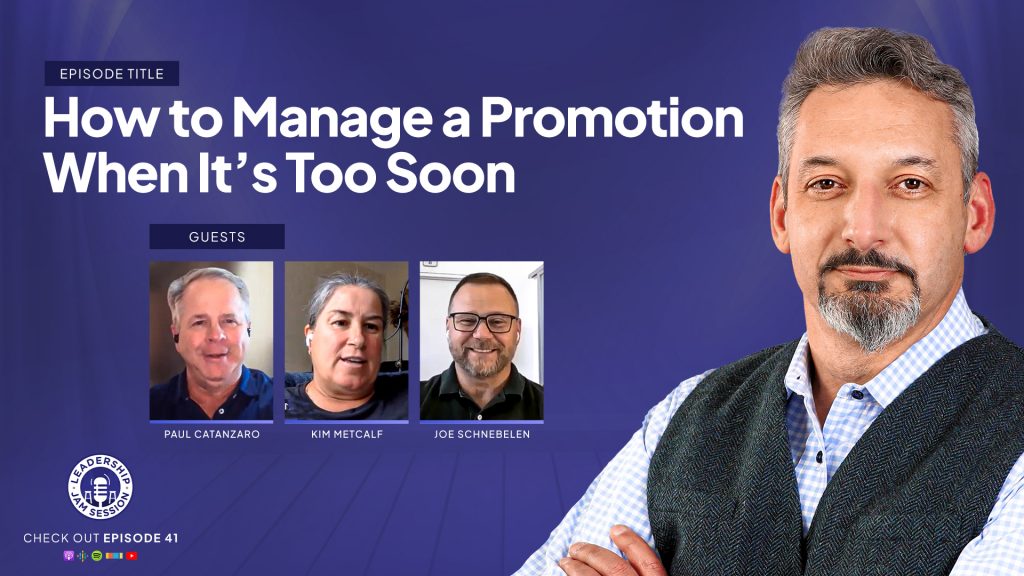041: How to Manage a Promotion When It’s Too Soon

Imagine the following: you have an employee looking to get promoted, but your manager or other decision-makers don’t think they are ready. What is the best way to deal with this challenging scenario?
Like in most tricky situations in life, the key lies in effective communication. It takes coordinated effort and honest conversation to determine if the employee truly meets the required skills for that promotion.
You may have to tell your employee to pump the brakes and work towards getting in the right light to be promoted.
And as a manager, you have to make sure you’re providing the right opportunities for your employees to demonstrate that those changes are taking place.
But your employee owns those action steps. You’re helping them to create it and providing them with the action steps, but they own executing that plan as well. That’s when actual growth as an employee happens.
I’m Rob Fonte, and today I’m joined by Kim Metcalf, Paul Catanzaro, and Joe Schnebelen to discuss the best ways to deal with a promotion when it’s too soon.
Dealing with an employee’s baggage and negative perceptions
An employee’s history can cloud people’s ability to judge that person objectively. So, the first step you should take as a manager when a situation like this arises is to put the employee’s history aside and focus on answering the following questions:
- Does the employee meet the eligibility criteria?
- How does the employee fit up against other candidates in that criteria?
- Is this the proper position for this particular employee?
It’s all about testing the waters; your goal is to get honest feedback on that employee from your peers and decision-makers. If the team decides this person meets the criteria and has done everything asked of them to earn a promotion, then you’ve got to look past their history.
However, sometimes these negative perceptions can have a solid foundation. What do you do when you have somebody who does meet the eligibility criteria yet they’re still dealing with baggage that could be placed appropriately on them?
In this case, you need to be honest with both your employee and the decision-makers. The employee needs an opportunity to prove they are the right fit for the role, and as a manager, you need to provide your employees with the means to demonstrate their professional growth.
So, even if the employee doesn’t get that promotion right away, you’re letting decision-makers know that this person is willing to put in the effort to demonstrate they have matured personally and professionally.
You might need to discuss specific action items for your employee to work on to place themselves in the right light to be promoted. Ultimately, the expectation to set with someone who does not have a pristine past is that it’s simply going to take some time.
Why teamwork is key during the hiring process
It’s no fun to say to your peers: “I made a mistake with this hire; I got the wrong person in the wrong job.”
This is why teamwork is crucial for a successful hire; having support from your peers when interviewing potential candidates for the role can drastically reduce the chances of hiring the wrong person. And if this should be the case, responsibility falls on the whole team – not only on the hiring manager.
This strategy also provides leaders with an opportunity to prove they can handle responsibility. Great leaders hold themselves accountable if the person hired is not fit for that specific role; bad leaders blame the rest of the team for putting somebody in the wrong position.
Why it’s important to develop a culture of redemption
Let’s face it; everybody makes mistakes. We’re all human. So it’s essential to look at someone’s past mistakes more as an opportunity for improvement than a shortcoming that should haunt their whole careers.
Promote a culture in which employees are allowed to learn from their mistakes instead of being condemned for them. You will provide them with the confidence to grow personally and professionally.
And as a leader, you shouldn’t be afraid to make mistakes as well. Remember, if you’re making mistakes, you’re learning. If you’re not making mistakes, you’re not moving forward.
Key Takeaways
– Dealing with promotions when it’s too soon (00:00)
– Keep it to the criteria you’re discussing (03:00)
– Test the waters (04:00)
– How to handle baggage and negative perceptions (06:05)
– Is this the right role for the employee? (08:26)
– Why teamwork is crucial during the hiring process (12:53)
– Why it’s important to create a culture of redemption (15:55)
– It’s all about coordinated effort (18:58)
– Episode summary (21:33)
Leadership Resources
How are the leaders at all levels of management tackling the toughest challenges each day? Learn more at: https://sartoleadershipgroup.com

